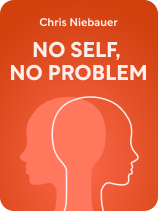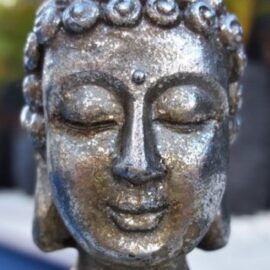

This article is an excerpt from the Shortform book guide to "No Self, No Problem" by Chris Niebauer. Shortform has the world's best summaries and analyses of books you should be reading.
Like this article? Sign up for a free trial here.
Have you ever questioned the nature of your self? What if your sense of identity was just an illusion?
In his book No Self, No Problem, Chris Niebauer explores Eastern perspectives on the self. He discusses concepts such as anatta in Buddhism, which challenges our Western notions of identity. Niebauer offers insights into how our understanding of self shapes our experiences.
Get ready to challenge your assumptions and explore a different way of perceiving yourself.
Anatta in Buddhism
In the East, people learn to regard the self as just an illusion, a concept closely related to anatta in Buddhism. Unlike people raised in the West, those who view the world through the lens of Eastern schools of thought—like Buddhism, Taoism, or the Advaita Vedanta school of Hinduism—learn a very different concept of the self. Niebauer explains these schools of thought teach that the self is an impermanent idea we have to loosen our grip on if we want to see reality as it actually is.
(Shortform note: What’s the true nature of reality? It’s a big question, but Eastern schools of thought teach that we’re all connected and participate in a universal whole. Buddhism, for one, teaches that we’re so interconnected with one another that we can’t make a meaningful distinction between one person’s “self” and another’s, so the self is just an illusion.)
According to several schools of Eastern thought, you don’t really have a self that exists in any real sense because the self as you perceive it is just a product of your thoughts. Niebauer explains that this means the self isn’t really the “thinker” you feel it is. Your thoughts appear in your consciousness, and you think your “self” produces or directs them. But it’s actually the other way around, and your sense of self comes from your thoughts. In other words, the self is no more real or durable than the thoughts that you think and forget from moment to moment. Niebauer explains that, to Eastern ways of thinking, holding onto the illusion of the self obscures more lucid ways of perceiving who you are and what you experience in the world.
(Shortform note: While it seems like you think your thoughts and those thoughts don’t exist until you think them, psychologists agree with Niebauer that this doesn’t appear to be true. So where do they come from? Subjectively, you could say that your thoughts seemingly come from nowhere. But objectively, they come from your brain—and from the vast array of experiences and sources of information that influence your brain. In a process experts don’t fully understand, your brain combines all of these influences to form your thoughts, perceptions, emotions, memories, and sensations. You’re not consciously aware of this happening. So as Niebauer notes, you don’t produce your thoughts; you simply become aware of them.)
A Buddhist teaching that Niebauer characterizes as crucial to the Eastern idea of the self is a concept called anatta, or “no self.” Niebauer explains that anatta means we have no permanent self, and the self only exists when we’re thinking about it. Buddhists contend that a belief in a stable self is not only erroneous but also leads to all of the suffering we experience in our lives. That’s because it makes us feel invested in thoughts, feelings, and judgments, which are all just temporary.
(Shortform note: While many people refer to anatta as the concept that we have no real self, as Niebauer does, some experts note the Buddha never actually said the self doesn’t exist. They say that anatta is more accurately translated as “not self” than “no self,” and the Buddha taught that you should resist your tendency to attach yourself to impermanent thoughts and feelings. The idea isn’t to convince yourself that those thoughts, emotions, or perceptions aren’t real, but to see them for what they are: impermanent. When you can watch them come and go, then you can realize that everything that contributes to your sense of self is always changing and remind yourself that these things are “not-self” and not worth holding onto.)

———End of Preview———
Like what you just read? Read the rest of the world's best book summary and analysis of Chris Niebauer's "No Self, No Problem" at Shortform.
Here's what you'll find in our full No Self, No Problem summary:
- Why everything you know about yourself is wrong
- How science is catching on to what Eastern religions have been teaching for millenia
- How to loosen your grip on the thoughts and judgments that make you dissatisfied with your reality






